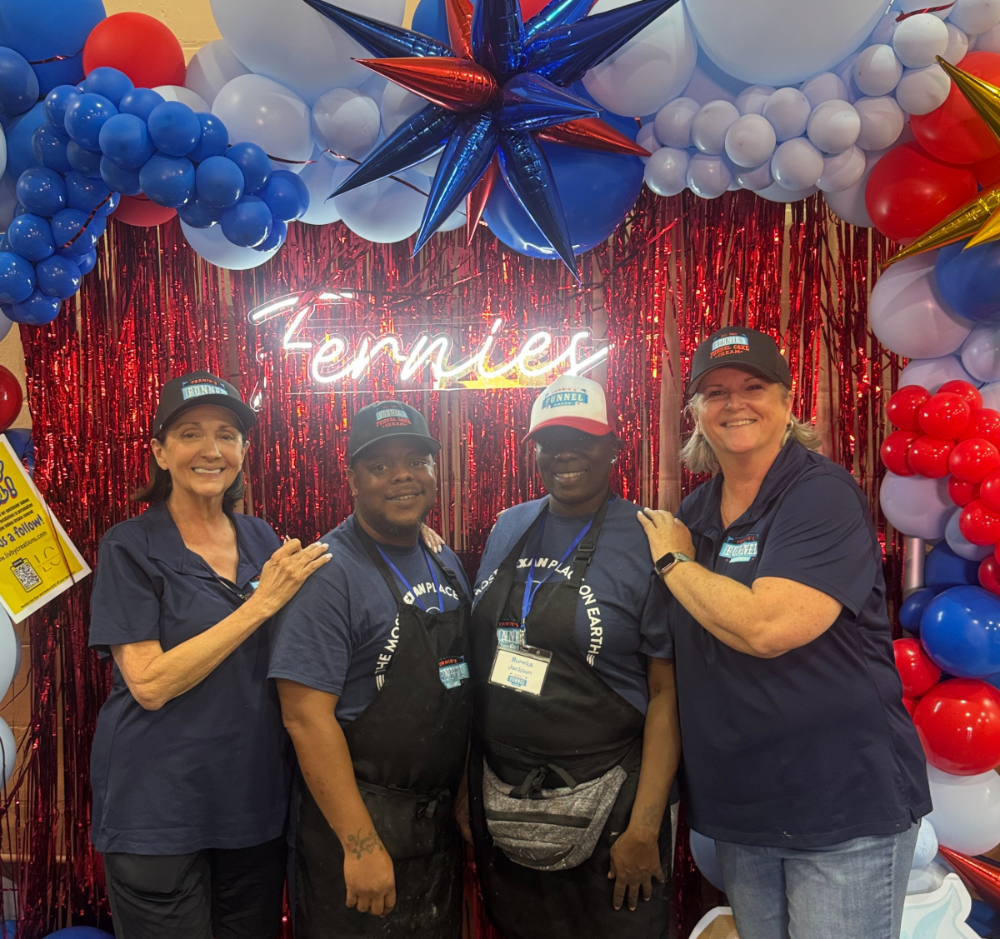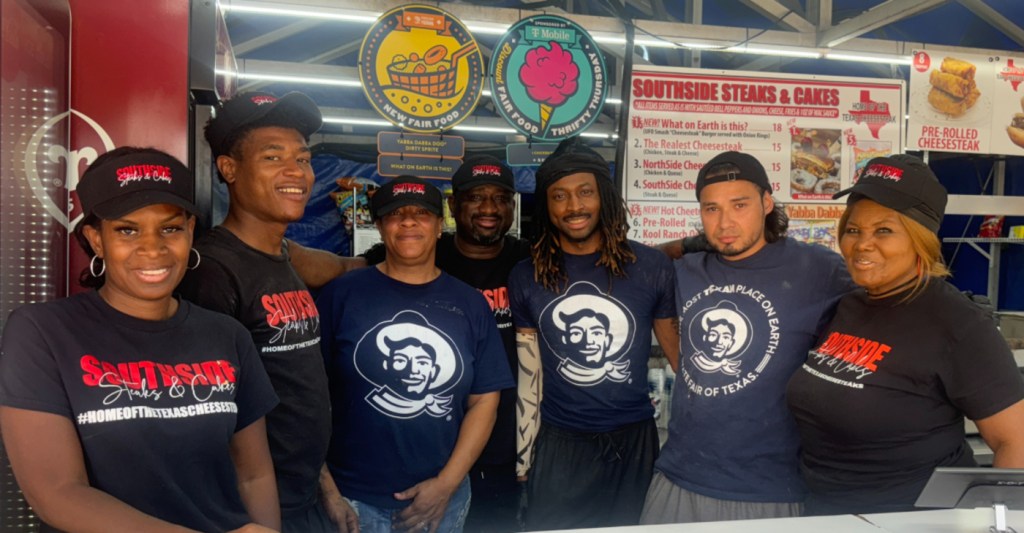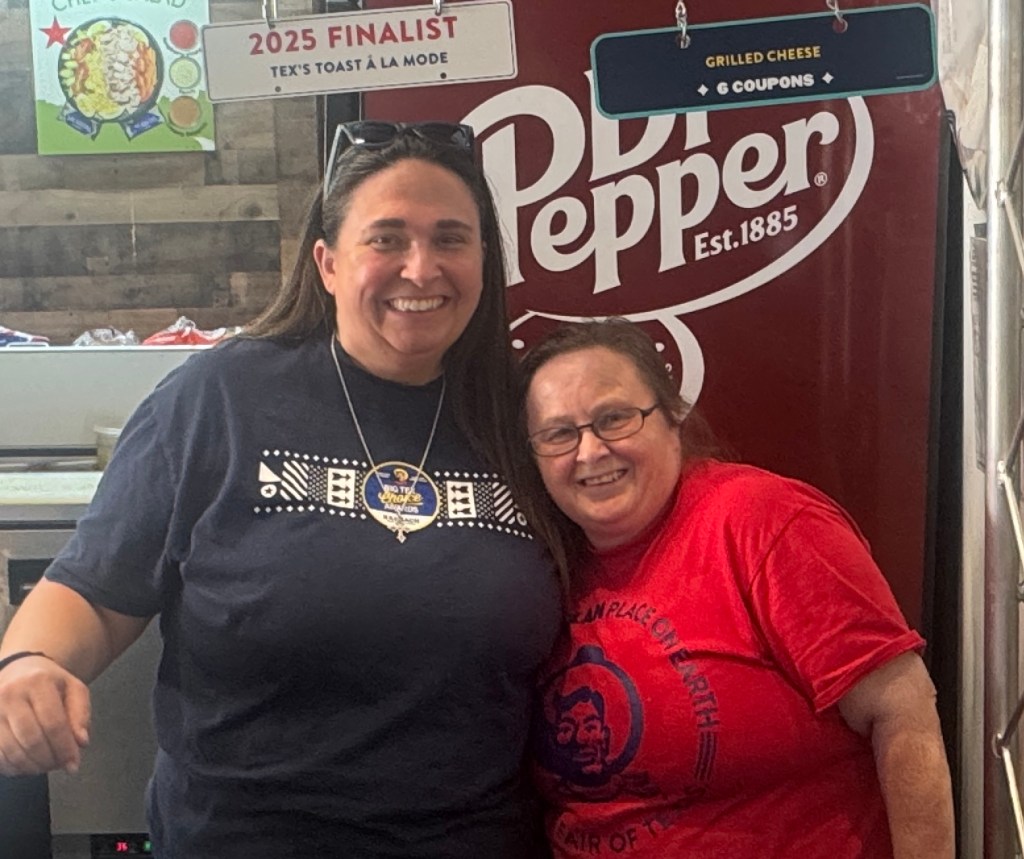
Kevin Brown

Audio By Carbonatix
The State Fair of Texas is an institution. It’s also a deep-fried, sweat-soaked, wallet-draining nightmare. But the fair, and the canola oil-induced stomach ache that accompanies it, is a rite of passage. Whether they’re exactly happy about it or not, most North Texans will at some point in the 24 days of the fair find themselves handing $30 to a third-party parking lot attendant, just so they can ride topsy-turvy death traps that could maybe use one or two more screws under the watchful eye of Big Tex.
The swirling lights of stomach-churning rides, ringing bells of water gun games and click-clacking hooves of mounted patrolmen are a gluttonous point of pride and pain for the millions of attendees who will walk through Fair Park as we bid our final adieu to the oppressive summer heat and welcome the insideness the autumnal season brings.
But the fair isn’t just about the teenagers sharing their first kiss on the Texas Star Ferris wheel, or the food-fluencers that descend upon the Bible Belt to commit incomprehensible caloric sins.
In the few short weeks that the dilapidated Fair Park becomes a campground for state-pride festivites in the name of economic abundance, the fair is life-changing for many of the workers who perform the grueling tasks that keep it running.
For those on the other side of the counter, the ones who go home with blistering wounds from splashing fry baskets, who leave with a head-to-toe coating of tackiness from the artificial sweetness that lingers in the air, whose bones and muscles ache for three weeks straight, the fair is the mark of a new beginning. It’s hard work. It’s hot. It’s sticky. It’s painful. But the booths that deal in inventive, butter-laden delights also deal in second chances.
Oil Is Thicker Than Blood
Three years ago, Roneka and Clardy Richardson were living out of their car. They had just been discharged after a month-long hospital stay. The couple had put eight months’ rent, $8,000, down on a home in South Dallas. But within weeks, they became deathly ill from tinea, a fungal infection. The house, rife with termites and dermites, was condemned, and the Richardsons lost their life’s savings, their home, their jobs and all their belongings, including paperwork like their birth certificates.
With nowhere to go and little hope left, the Richardsons took the first job they could get, working the fry basket at Fernie’s Funnel Cakes, the best funnel cakes around, they say.

Alyssa Fields
“We had no choice,” said Clardy. “We had to go all out because all we had was the fair. This was our only source of income. When we came here, this was everything.”
After their second season at the fair, the Richardsons secured housing and opened their own cleaning business. Neither of which would have been possible without the fair and their two fairy godmothers running Fernie’s, they say. Johnna McKee and her sister, Christi Erpillo, have been working the State Fair of Texas for 56 years, primarily dealing in no-nonsense powdered sugar perfection.
“But when we got here, they were just so genuine and so sweet,” Roneka said through tears. [Fernie’s] gave us a job, and it went on from there. [They] didn’t really know if we were going to come back the next year. [They] helped us through that whole thing.”
Fernie’s has a reputation at the fair, and their secret ingredient to getting the perfect ooey-gooey inside on the crisp breaded noodles is simple: changing the fry oil every day, and an unparalleled love for their team.
“We have a lot of people that will go and say, ‘If you want to come to work at the fair, go and work at Fernie’s’, because they become our family,” said McKee, the chief financial officer. “That’s what it truly means. We’re there to help all year long.”
McKee and Erpillo say the joy of the fair for them isn’t in the money, though that’s a nice perk, but in watching their employees grow.
“The coupons are the nice part of it,” said Erpillo, the chief fry officer. “But if we can mentor or we can help one person, I think that’s what our mission is.”
Many of their workers start without the basic necessities of modern living, like a car or a phone.
“We give second chances,” said Eprillo. “It’s not that we give them, but we’ve had the opportunity to help people in many different ways… We’ve also had people who lived in shelters who came to work for us… About midway through, they’ll show me their [new] phone or savings account. By the end of the fair, they are beaming with pride, and some of them may even have a car. They’re a completely different person in 24 days.”
As two of Fernie’s star employees, the Richardsons will keep coming back every year that they can. But they don’t have to wait until September to see their favorite bosses because their chosen family is there for them all year long.
Steak and Sober Living, Well Done
David Ganoa was an addict for 21 years. At 38, he’s learning how to pay bills for the first time. Every day, he goes to Fair Park, works his shift in the oppressively hot Southside Steaks and Cakes outdoor booth, goes back to the sober living center he calls home and thanks God for his good fortune.
“It’s been a challenge,” he said. “I’m learning how to be responsible. For other people, it may be scary, but for me, I see it as an adventure. I’m getting to learn how to be a productive member of society. I’m learning how to deal with my emotions. I’m learning how to deal with conflict resolution.”
The day Ganoa finished rehab three years ago, he got a restful night’s sleep on his brother’s couch. The next day, he woke up bright and early and went straight to Southside Steaks and Cakes’ brick-and-mortar, having heard about their work therapy program. He was hired that day.
The shop, owned and operated by Nicole Sternes and Chris Easter, employs individuals experiencing homelessness, children aging out of the foster care system, and those with criminal records and offers them a comprehensive, six-pronged restaurant readiness program. The program includes crucial life skill building, like saving, applying for jobs and how to operate in a professional environment.

Alyssa Fields
“We saw the need that people actually need to be improved,” said Sternes. “We started working more on the workforce side, because when they come out of these situations, they don’t have money. We give them a fresh start, where some people probably would really just look over them.”
Ganoa no longer works full-time at the flagship shop, but this is his third time working the fair, and he’ll be back next year to continue paying it forward.
“From 15 years old, throughout my whole addiction, I didn’t know how to deal with my emotions,” he said. “I didn’t know how to work with people. I was a loner. I didn’t trust anybody. But they saw something in me. [Easter] believed in me. He was patient with me. He encouraged me every day.”
Easter and Sternes brought over their whole staff for this year’s iteration of the fair, and they wouldn’t have it any other way, and neither would Ganoa.
“Throughout this whole journey, they’ve been there every step of the way,” he said. “It’s truly been a blessing, and I truly I’m grateful to be a part of this.”
Malt, Milkshakes and Motivation
Eleven years ago, at her wits’ end, Candace Emery fled Philadelphia and the domestic violence situation she was in. On a wing and a prayer, she got herself to Dallas and walked through the doors of the Austin Street Center. She may have spent her first six months sleeping on a cot, but because of the shelter, she never spent a night sleeping on the streets.
“I wanted something different,” Emery said. “I came from a pretty abusive background, and I was like, you know what? I’m done. So here I am, down in Texas, now at the fair.”
Emery got an apartment 10 years ago and manages the Austin Street in-kind donation center, sorting through non-food donations. But when fall rolls around, she takes some time off from the closet and clocks in at the fair.
“To come into the fair, see the crowd, have fun, it’s cool,” she said. “It’s the best of both worlds. The fair is a happy place. People are happy and want to have fun. Austin Street is a happy place, but there’s a heaviness to it.”
Working at Austin Street, Emery met Michelle Edwards, the sales director and owner of the Highland Park Soda Fountain booth at the fair. The brick-and-mortar shop, a Highland Park icon, closed its doors forever in 2018, years shy of hitting its centennial anniversary. But they still come to the fair each year, and behind the counter are the hardworking women of Austin Street Center.

Alyssa Fields
“We tell them every day what a great job they’re doing,” said Edwards. “It’s neat watching them when they’ve done something and they’ve been successful at something. They get so excited, and it’s like turning on a light bulb for them. It’s really neat watching them open their eyes to things.”
This year marked Edwards’ 15th year at the fair, and her sixth year of sourcing employees directly from the shelter.
“There are ladies that have come out of domestic violence or alcohol or drug abuse situations that are trying to get a fresh start,” she said. “I love having them, and it teaches them different skills that they need, and it’s a lot of fun.”
Emery isn’t the same person who walked into the shelter in Dallas over a decade ago, and she relishes watching women in similar situations go through the same changes she did, all while serving up malts and milkshakes.
“That’s part of my ‘Why?’, seeing our neighbors blossom and go to the next step and come out of their shell. It’s amazing,” said Emery.